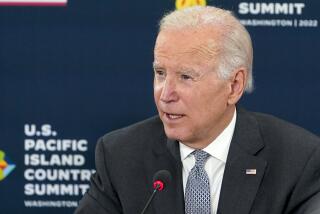Asian Nations Discuss Security Forum : Diplomacy: Facing regional threats, ASEAN members seek solidarity. U.S., other countries would be involved.
SINGAPORE — Foreign ministers of six Southeast Asian nations began two days of talks Friday to consider setting up an 18-nation regional security forum and to attempt a joint response to President Clinton’s call for a meeting of Pacific leaders in the autumn.
Regional security topped the meeting agenda of the Assn. of Southeast Asian Nations--Singapore, Thailand, Malaysia, Brunei, Indonesia and the Philippines. The group’s officials have drawn up plans to create an ASEAN Regional Forum, which is seen as a multilateral institution designed to settle such problems as border disputes and other threats to security before they erupt into war.
In addition to ASEAN states, the forum would include the United States, the European Community, Canada, Japan, Australia, South Korea and New Zealand, which are called ASEAN’s permanent “dialogue partners.” Foreign ministers from the seven dialogue partners, including Secretary of State Warren Christopher, will begin meeting their ASEAN counterparts Sunday to discuss the plan.
The security forum would also include Russia and China, which are attending the meeting as guests, as well as Laos, Vietnam and Papua New Guinea, which have observer status.
The decision is significant because in the past ASEAN has shied away from discussing security, in part out of fear of being dragged into superpower rivalries. But the region now faces some security problems of its own, notably China’s military buildup and its decision to take an aggressive stand on ownership of the Spratly Islands, atolls in the South China Sea that are also claimed by Vietnam and four other nations.
There have been fears that China and Vietnam could go to war over the Spratlys, which are believed to sit atop substantial reserves of petroleum.
Speaking in Washington before his departure, Christopher indicated that the United States would not allow the proposed security forum to interfere with any bilateral relationship between the United States and Asian countries.
The United States, having closed its air and naval bases in the Philippines last year and moved some of its logistics personnel to Singapore, is believed to have offered security guarantees to several countries in the region.
The ASEAN foreign ministers are expected to approve creation of the forum at their two-day meeting but are not expected to grapple with substantive issues until they meet next year in Bangkok, Thailand.
A similar consensus will be hard to reach on Clinton’s call for a summit of Asian leaders to discuss regional economic issues under the auspices of the Asia-Pacific Economic Cooperation forum.
Malaysia has rejected the invitation, apparently because it fears that the United States will try to dominate. Instead, it has proposed creating an East Asian Economic Group that excludes Western countries such as the United States and Canada.
The idea is to create an Asian counterbalance to the European Community and the North American Free Trade Agreement among the United States, Canada and Mexico. But a number of Asian countries such as Japan have balked at the idea because they fear it might alienate the United States.
ASEAN ministers will also attempt to grapple with implementation of a proposed free trade area among the six nations approved last year. The proposal has gotten off to a slower than expected start as member countries seek to protect domestic industries.
More to Read
Sign up for Essential California
The most important California stories and recommendations in your inbox every morning.
You may occasionally receive promotional content from the Los Angeles Times.










